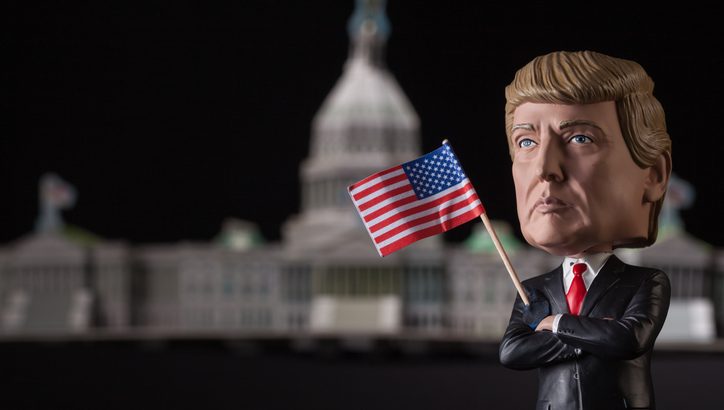David Schanzer, director of the Triangle Center on Terrorism and Homeland Security, discusses the flurry of foreign trips undertaken in the past week by Trump cabinet members, the duties and responsibilities of his new national security adviser and the progress in the fight to retake Mosul.
Listen at On SecurityCategory: Global

When Trump, Cabinet Diverge On Foreign Policy
A tip for leaders who are confused about whether to trust the president or his emissaries is to watch how Trump reacts when Cabinet secretaries appear to contradict what he’s said. “They are not being rebuked by the White House for doing what they’re doing,” says political scientist Peter Feaver, a former member of the National Security Council staff under President George W. Bush. “That is a very important fact.”
Read More in The Boston Globe
Podcast: The Smart Border
How can the U.S. increase security along the southern border without building a wall? Stephen Kelly, a visiting professor of the practice in the Sanford School of Public Policy, says more cooperation between law enforcement agencies on both sides of the border is key.
Listen on Policy 360
Trump Taps New National Security Adviser
Political scientist Peter Feaver, a scholar on civil-military ties, says he expects Army Lt. Gen. H.R. McMaster to take a skeptical view of Russia, seeing Moscow as a dubious partner and major potential threat to U.S. security. And Feaver says he expects a similar skepticism toward Iran, whose support for proxy groups across the Middle East many senior military officials say has gone unchecked.
Read More in The Washington Post
DHS Considered National Guard for Immigration Roundups
Historian Gunther Peck says mass deportations would hurt numerous businesses. “Many businesses profit from undocumented workers and would be very hard pressed to replace them. They do work that actual citizens don’t want to do, and they do it for low wages. So, if you were to deport and round up a lot of those hardworking men and women, you would be hurting a lot of American businesses.”
Read More at WRAL
Good Luck Making America Safe Again Without Mexican Military
“Most Americans don’t remember that we invaded Mexico at least three times, and forced it to give up nearly half of the territory they won in their independence from Spain,” says public policy professor Stephen Kelly, who served as deputy chief of mission at the U.S. Embassy in Mexico from 2004 to 2006. “Nowhere is that feeling of invasion, that Mexico has been robbed and violated, more strongly felt than in the Mexican army.”
Read More in McClatchy
Trump Focus Misses Growing Risk From Right-Wing Extremism
Focusing solely on Islamic extremism “would be a huge mistake,” says David Schanzer, director of Duke’s Triangle Center on Terrorism and Homeland Security. He says programs meant to counter extremism “were a hard sell for the Muslim community even before” the election and that Muslim communities see them “as a form of surveillance.”
Read More in Foreign Policy
President Trump’s Evolving Foreign Policy
Under a month into Donald Trump’s presidency, his national security adviser Mike Flynn resigned, the dance with Russia has been constant since Trump took office and relations with Mexico and China have been strained. Sanford School professor David Schanzer talks about the foreign policy implications.
Listen on Minnesota Public Radio

Trump and Terrorism: Finding a Way Forward
“The United States will soon reach a crossroads in its struggle against terrorism,” writes political scientist Peter Feaver and a colleague. “The international coalition fighting the Islamic State (also known as ISIS) has driven the group out of much of the territory it once held and, sooner or later, will militarily defeat it by destroying its core in Iraq and Syria. But military victory over ISIS will not end the global war on terrorism that the United States has waged since 9/11.”
Read More in Foreign Policy

President Trump’s Claims About Immigrants
“The temporary halt to President Trump’s travel ban has not stopped him from continuing to lash out against immigrants and refugees. Once again, Trump is falsely painting immigrants and refugees as terrorists, and once again, journalists and others are fighting back with facts,” writes historian Gunther Peck.
Read More in The News & Observer
Trudeau Visits U.S. With Two Aims
Canadian Prime Minister Justin Trudeau on Monday opened talks at the White House with U.S. President Donald Trump, seeking to nurture economic ties while avoiding tensions over issues such as immigration on which the two are sharply at odds. “You don’t have to be a genius to see there are some stark differences between them,” says Sanford School professor Stephen Kelly, former U.S. deputy chief of mission to Ottawa.

Trump’s New Math on Old Regulations
Rather than weigh the pros and cons of individual rules as they come, President Trump’s executive order directs federal agencies to adhere to a simple trade-off: For every new regulation finalized, two old ones must be phased out. Andrea Renda, a senior fellow at the Kenan Institute for Ethics, comments on the potential pitfalls with this approach.
Read More in Bloomberg

